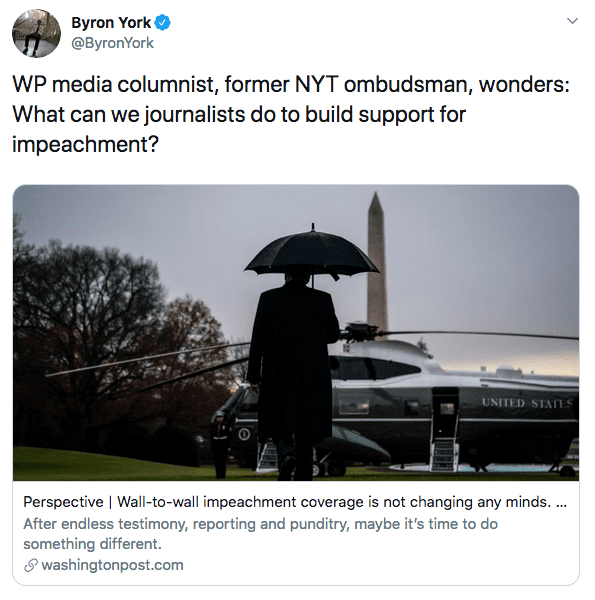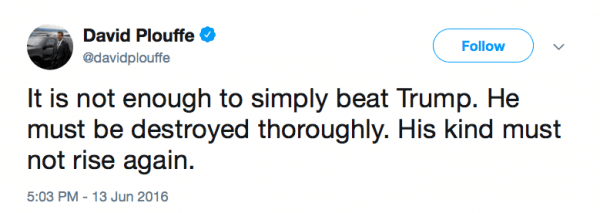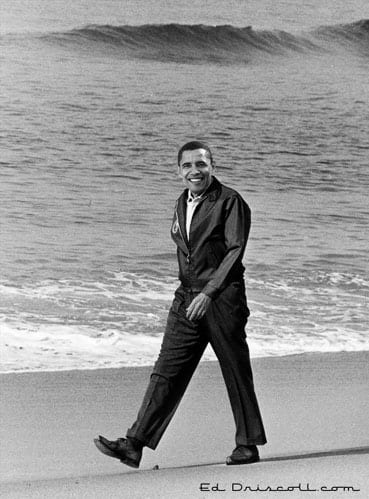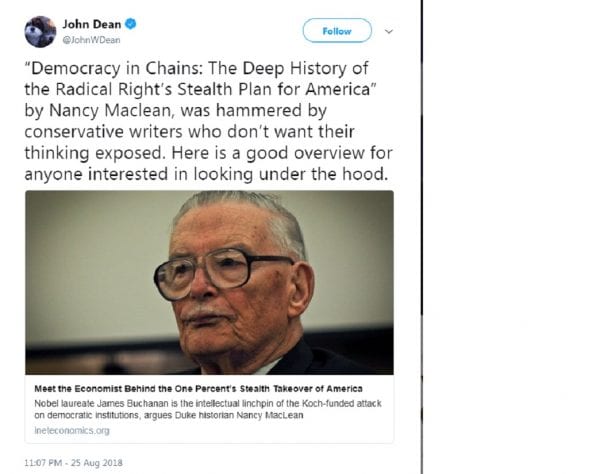TODAY IS THE 48th ANNIVERSARY OF THE WATERGATE BREAK-IN, which would eventually birth: The hero-journalist trope — Watergate’s go-to mythical media narrative.
Search Results
WORSE THAN WATERGATE: ‘Wingman’ Eric Holder orchestrated ‘Obamagate,’ says successor attorney general.
In Above the Law, provided in advance of its release, Whitaker described a department that was more political under Obama than any department since President Richard Nixon’s, one that sought to promote the efforts of partisans such as FBI chief James Comey, who has since been fired by Trump.
“What Holder is advocating for,” he wrote, “is a government full of Jim Comeys: government officials determining on their own what the Constitution demands, deciding which laws to prosecute and which to ignore, selectively releasing information to the media about Americans under investigation, and held accountable neither to the chief executive nor to voters.”
And as Obama’s “wingman” at the department, added Whitaker, Holder built a team that would remain after he left and that would eventually shut down a probe into Hillary Clinton’s email scandal at the State Department and eagerly build up an investigation into alleged Russian collusion with the Trump campaign in the 2016 election.
“There’s no doubt that Russia tried to influence the 2016 presidential election,” he wrote in the book from Regnery Publishing.
“But the political meddling within our own government, within the Justice Department, and within the intelligence community poses a far greater threat to Americans than any Russian internet troll farm. Without the rule of law, without respect for the Constitution, without honest administration in the Justice Department, we don’t have a republic,” he added.
The book is an indictment by a true insider of the “deep state” of liberal bureaucrats trying to protect their own and ignore Trump’s election.
It also highlighted the double standard of Obama-era officials, especially on recusals from cases they had an interest in. One that jumped out was of the case and conviction of former Trump national security adviser Michael Flynn.
Gangster government.
IT’S WORSE: House Minority Leader McCarthy: Spying on the Trump Campaign Is ‘a Modern-Day Watergate.’
I say it’s worse because Watergate was a high-level coverup of a low-level crime, but the political corruption of the executive branch was a high-level crime, period.
DON SURBER: What Trump learned from Watergate.
Read the whole thing.
IT’S LIKE THE WATERGATE HEARINGS, BUT BY MORONS:

SEAN DAVIS: ANTI-TRUMP IMPEACHMENT THEATER IS ‘WATERGATE COSPLAY’ FOR DEMOCRATS.
Which makes perfect sense — today’s leftist college kids are engaged in cosplay versions of the ‘60s rebellions they read about on college campuses. In 2017, Steven Spielberg released The Post, his bookend to All the President’s Men, as a nudge for the swamp to relive 1973.
Though without the polyester shirts, hideous napkin-width neckties and lapel collars the length of a B-58’s wingspan, and perhaps, with a very different ending: Jonathan Turley Tells Disappointed CBS Hosts: Impeachment ‘Designed to Fail.’
FOUR WAYS PELOSI’S IMPEACHMENT FAILS HILLARY’S WATERGATE TESTS: There was a time a little more than a year ago when Clinton actually had some sensible observations about her role in the 1974 Watergate impeachment, the one against her husband in 1998 and the mockery now hurtling to its denouement.
BYRON YORK: Democrats, stuck in Watergate mode, bungle Lewandowski testimony.
The bottom line is that Trump has flummoxed Watergate-fixated Democrats with a simple strategy: cooperate with the special counsel. In not cooperating with the Judiciary Committee leadership, he is in effect arguing that he has already cooperated with the important investigation and does not have to cooperate with a political investigation on Capitol Hill, especially when the House leadership cannot decide whether it is a formal impeachment proceeding or not.
Read the whole thing.
JOHN DEAN: THE JAMES COMEY OF WATERGATE. Both are media darlings in spite of outrageous professional conduct. “Astonishingly, both now teach courses on ethics and professional responsibility, seemingly in the belief their conduct was exemplary to other members of the legal profession.”
Earlier: ‘Watergate’ Doesn’t Mean What the Press Thinks It Means.
ANDREW KLAVAN: ‘Watergate’ Doesn’t Mean What the Press Thinks It Means.
Recently, reading Mark Levin’s Unfreedom of the Press, I was reminded that, before reporters went on their great crusade against Richard Nixon, they had overlooked a whole lot of corruption in the Democrat presidents who preceded him.
Levin tells how John F. Kennedy, with the knowledge of his brother and Attorney General Robert, nudged the IRS into auditing conservative groups. With Kennedy approval, the FBI was also employed to investigate those the administration disliked, including Martin Luther King Jr. Lyndon Baines Johnson would later increase the politically motivated auditing and spying. None of this was uncovered until later on.
Ben Bradlee — the editor of the Washington Post, where Woodward and Bernstein broke the Watergate story — was well aware of his pal Kennedy’s misuse of the tax and investigative agencies. Not only did he not report it, he allowed himself and his paper to be manipulated by information JFK had wrongly obtained.
This totally changes the Watergate narrative. Nixon’s dirty tricks and enemy lists may have been creepy and wrong, but the press exposure of these misdemeanors came after years of ignoring similar and worse malfeasance by Democrat administrations.
That changes what Watergate means. That transforms it from a heroic crusade into a political hit job, Democrat hackery masquerading as nobility. The press turned a blind eye to the corruption of JFK and LBJ, then raced to overturn the election of a man they despised—despised in part because he battled the Communism many of them had espoused.
What is it Karl Marx said: History repeats itself, the first time as tragedy, the second time as farce?
Read the whole thing. While the left launched Watergate to destroy Nixon, the discovery by the American people that It Didn’t Start With Watergate, as Victor Lasky accurately titled his 1977 book did much to make the distrust of government an “unexpectedly” bipartisan affair in the 1970s. Or as David Frum puts it in his 2000 book How We Got Here: The 70s The Decade That Brought You Modern Life — For Better Or Worse:
Some blame Watergate for this abrupt collapse of trust in institutions, but not very convincingly. For one thing, the decline in trust begins to appear in the polls as early as 1966, almost a decade before the Watergate was known as anything more than a big hole in the ground alongside the Potomac River. For another, the nation had managed unconcernedly to shrug off Watergate-style events before. Somebody bugged Barry Goldwater’s apartment during the 1964 election without it triggering a national trauma. The Johnson administration tapped the phones of Nixon supporters in 1968, and again nothing happened. John F. Kennedy regaled reporters with intimate details from the tax returns of wealthy Republican donors, and none of the reporters saw anything amiss. FDR used the Federal Bureau of Investigation to spy on opponents of intervention into World War II—and his targets howled without result. If Watergate could so transform the nation’s sense of itself, why did those previous abuses, which were equally well known to the press, not do so? Americans did not lose their faith in institutions because of the Watergate scandal; Watergate became a scandal because Americans were losing faith in their institutions.
Which brings us back to Andrew Klavan’s article above, in which he writes, “History repeats itself, the first time as tragedy, the second time as farce…Like the Nixon takedown, the attacks on Trump come after years of turning a blind eye to the corruption of a Democrat. Obama’s IRS campaign against the Tea Party? His lies about Benghazi? His Fast and Furious fiasco? His shutdown of a massive drug investigation to appease Iran? No big deal. Obama was, as almost every mainstream outlet has declared, ‘scandal free.’”
Read the whole thing.
HMM: Conrad Black: 2020 Vote Looks Like 1972 — With No Watergate.
It is exquisite that Mr. Trump has used the hard-left social press to outmaneuver the traditional media kingmakers and now nods approvingly as Senators Warren and Sanders and their allies attack the new media cartel, whose leading figures are almost as hostile to the president as are those seeking the Democratic nomination against him next year.
Whatever anyone might think of the president’s public personality, his progress toward his goal of radically altering the government and shattering or co-opting the long-tenured OBushinton political establishment has been a relentless and unstoppable juggernaut. His candidacy was mocked, his chances of election were minimized, his ability to avoid impeachment was artificially maintained in doubt for over two years, and the idea that he will be easy to defeat next year is only starting to expire, strangled by facts.
The country is prosperous and the attempt to orchestrate economic pessimism will be no more successful than all the bunk about misogyny, incitements to violence, “racially charged” demagogy, corruption, treason, chaos in the White House, and the rest of it.
Read the whole thing.
MAFIA HIT MAN ASSESSES JOHN DEAN: The aging Watergate felon came back for an encore Monday before the House Judiciary Committee, chaired by Rep. Jerrold Nadler, Democrat of New York.
The American Spectator’s George Parry, a former federal attorney, talked to an old informant, a reformed Mafia hit man, who knew Dean in federal prison. The hit man’s assessment of Dean? Nadler should hold on tight to any silver coins he has.
THIS IS MY SO VERY SHOCKED FACE: Is Russiagate worse than Watergate?
FLASHBACK, MAY 2017: Was Obama administration illegal spying worse than Watergate?
In 1972, some employees of President Nixon’s re-election committee were caught when they broke into the Democratic National Committee headquarters to plant a bug. This led to Nixon’s resignation and probably would have led to his felony prosecution had he not been pardoned by his successor, Gerald Ford.
But if a single bugging of the political opposition is enough to bring down a presidency — and maybe lead to an unprecedented criminal prosecution of a former president — then what are we to make of the recently unveiled Obama administration program of massively spying on political opponents in violation of clearly established law?
Because that’s what was unveiled last week.
It’s now become much clearer what happened. And yes, it was much worse than Watergate, since it involved the perversion of existing government agencies into political spying and persecution.
Plus:
Will the Justice Department investigate and prosecute former Obama officials? It seems hard to imagine. But then, so did Nixon’s resignation, when the Watergate burglary was first discovered.
This debacle also raises serious questions about the viability of our existing “intelligence community.” In the post-World War II era, we gave massive power to the national security apparatus. In part, that power was granted in the belief that professionalism and patriotism would lead people in those agencies to refuse to let their work be used for partisan political purposes.
It now seems apparent that we overestimated the patriotism and professionalism of the people in these agencies, who allowed them to be politically weaponized by the Obama administration. That being true, if we value democracy, can we permit them to exist in their current form?
Answer: No.
CONRAD BLACK: Still Dreaming of Watergate II.
NEO: Why did the press do it? The influence of Watergate on Russiagate. “The fact that Russiagate was actually the un-Watergate probably did not even cross their minds. This was the reverse Watergate, the Watergate in which the president was not the perp, and the instruments of intelligence and justice were weaponized against him rather than that he made a blocked attempt to enlist them against his enemies. In the un-Watergate the press, instead of being able to successfully cast itself as the bold uncoverer of the terrible truth about the president, has been revealed to have been mainly in the business of amplifying lies about the president.”
ROGER KIMBALL: Watergate, By Any Other Name. “Over the last few days, The New York Times, The Washington Post, and other anti-Trump outlets have revealed, and reveled in, something that many observers suspected for a long time. That the investigation into various figures associated with the Trump campaign—not only Carter Page, but also George Papadopoulos, Paul Manafort, Michael Flynn, and Michael Cohen—was just a pretext. The main target all along was Trump himself. As Andy McCarthy observed, ‘following the firing of FBI director James Comey on May 9, 2017, the bureau formally opened an investigation of President Trump.'”
To revive an old Democratic trope, I question the timing. But read the whole thing.
Plus: “’Spying on the opposition campaign in the absence of corroborated evidence of a crime.’ ‘Controversial?’ You think? How about nefarious and probably criminal? Richard Nixon is unavailable for comment.” It’s different when it’s done to Republicans because shut up.
THE TROUBLING PARALLELS BETWEEN TODAY AND THE WATERGATE ERA: The media was determined to “reverse the verdict of the election by non-constitutional means”; Trump 2016? No, Nixon 1972.
MICHAEL BARONE: Obama’s spying scandal is starting to look a lot like Watergate.
So much for those who dismissed charges of Obama administration infiltration of Donald Trump’s campaign as paranoid fantasy. Defenders of the Obama intelligence and law enforcement apparat have had to fall back on the argument that this infiltration was for Trump’s — and the nation’s — own good.
It’s an argument that evidently didn’t occur to Richard Nixon’s defenders when it became clear that Nixon operatives had burglarized and wiretapped the Democratic National Committee’s headquarters in June 1972.
Until 2016, just about everyone agreed that it was a bad thing for government intelligence or law enforcement agencies to spy — er, use informants — on a political campaign, especially one of the opposition party. Liberals were especially suspicious of the FBI and the CIA. Nowadays they say that anyone questioning their good faith is unpatriotic.
The crime at the root of Watergate was an attempt at surveillance of the DNC after George McGovern seemed about to win the Democratic Party’s presidential nomination, just as the government misconduct in Russiagate was an attempt at surveillance of the Republican Party’s national campaign after Trump clinched its nomination.
In both cases, the incumbent administration regarded the opposition’s unorthodox nominee as undermining the nation’s long-standing foreign policy and therefore dangerous to the country. McGovern renounced the Democrats’ traditional Cold War policy. Trump expressed skepticism about George W. Bush and Obama administration policies on NATO, Mexico, Iran and (forgetting Barack Obama’s ridicule of Mitt Romney on the subject) Russia.
Yep. The thing is, why spy on Trump when everybody expected Hillary to win? I think the answer is that they wanted to gather dirt they could use to destroy him and discredit his supporters after the election was over. See this, for example:

So I think it wasn’t so much about winning an election through dirty tricks, but about something even dirtier, looking for a way to prosecute and bankrupt Trump after he lost, as a warning to others. An awful lot of people involved in this should wind up in jail, disbarred, and unemployed.
MICHAEL BARONE: Obama’s spying scandal is starting to look a lot like Watergate.
Obama as Nixon? I just can’t see it, myself.

JOHN HINDERAKER: Why Trump Tweets. “If true, it is 1,000 times bigger than Watergate. But until now, wild horses couldn’t have pulled the facts that have been steadily emerging about the real scandals of the 2016 election out of the AP. Why does the AP grudgingly cover them now? Because they were tweeted by President Trump. Democratic Party outlets like the Associated Press know that millions of people understand quite a bit about the brewing Obama FBI/CIA/Fusion GPS/Clinton campaign/FISA scandal–not just the eggheads who read National Review, but the great many who follow the president on Twitter, or see accounts of his tweets elsewhere. More than anyone else, it is President Trump who has stood up to the swamp in the person of Bob Mueller, and is forcing the Democratic Party press to begin covering the real story of the 2016 election.”
VICTOR DAVIS HANSON: Rethinking Watergate.
For liberals in 1973, the status quo was considered right-wing and dangerous—and it was therefore to be opposed at all costs to find the truth about Nixon. In 2016, Clinton was part of a status quo that extended eight years back through Barack Obama’s tenure and was considered the favored candidate by the permanent bureaucracy, the mainstream media, and the legal establishment, many of whom sought to help her defeat Trump.
Think about changing the roles in 2016. Imagine a Trump-funded anti-Clinton dossier drawing on Russian gossip about Secretary Clinton, peddled by the FBI, rubber-stamped by FISA courts, and used to monitor Clinton campaign operatives to find dirt on Clinton and to leak such information to the press—in the last days of a presidential campaign. Would we not then see a true progressive reenactment of Watergate, with all of the concerned parties repeating their 1973 roles—the press especially frenzied rather than somnolent?
FISA-gate is not just an upside-down Watergate. It also forces us to rethink Watergate itself. The facts, of course, that led to Nixon’s 1974 resignation are unchanged and condemnatory. But the relative eagerness to uncover them can be recalibrated by the contrast with FISA-gate.
In other words, was it really principle and concern for the transparent and blind administration of justice that drove the original and necessary official and media investigation of Nixon? Or, in some measure, did the furor over Nixon arise over his seemingly odious politics and person that for decades had enraged his enemies?
FISA-gate, and the media’s response to it, is not so much another Watergate as an anti-Watergate. The disconnect with the past begs us to redefine the story of Watergate itself 45 years later: Was it what Richard Nixon did, or who Richard Nixon was, that ignited the scandal?
The answer to that question can be found at Commentary, where Andrew Ferguson explores The Post, the new bookend to Redford and Hoffman’s All the President’s Men, in an essay titled “Mr. Spielberg Goes to Washington:”
Capra intended his movie to be a hymn to those ideals, and for nearly 80 years that’s what audiences have taken it to be. It is no such thing. Mr. Smith seethes with contempt for the raw materials of democracy: debate, quid pro quo deal-making, back-scratching compromise—all the tedious, unsightly mechanics that turn democratic ideals into functioning self-government. In Capra’s telling, democracy can be rescued only by anti-democratic means. An appointed charismatic savior (he’s not even elected!) uses a filibuster (favorite parliamentary trick of bullies and autocrats) to release the volatile pressure of a disenfranchised mob (the great fear of every democratic theorist since Aristotle). From Mr. Smith to Legally Blonde 2, the point of the Washington movie is clear: Left to its own devices, without an outside agent to penetrate it and cleanse it of its sins, self-government sinks into corruption and despotism.
Steven Spielberg is the closest thing we have to Capra’s successor. Like all his movies, The Post has many charms: a running visual joke about Bradlee’s daughter making a killing with her lemonade stand threads in and out of the heavier moments like a rope light. On the other hand, his painstaking obsession with period detail often fails: A hippie demonstration against the Vietnam War looks as if it’s been staged by the cast of Hair. The set-piece speeches are insufferable, an icky glue of sanctimony and sentimentality. What we call the Pentagon Papers was a classified history of the lies, misjudgments, and incompetence of four presidents, from Harry Truman to Lyndon Johnson, ending in 1968. Sometimes the speechifying is directed at the malfeasance of these men, as when Bradlee bellows: “The way they lied—those days have to be over!”
Weirdly, though, the full force of the movie’s indignation is aimed at Richard Nixon.
Which seems odd, considering the strange new respect the man has gotten from the left in recent years.
CHRIS BUSKIRK: Worse Than Watergate.

